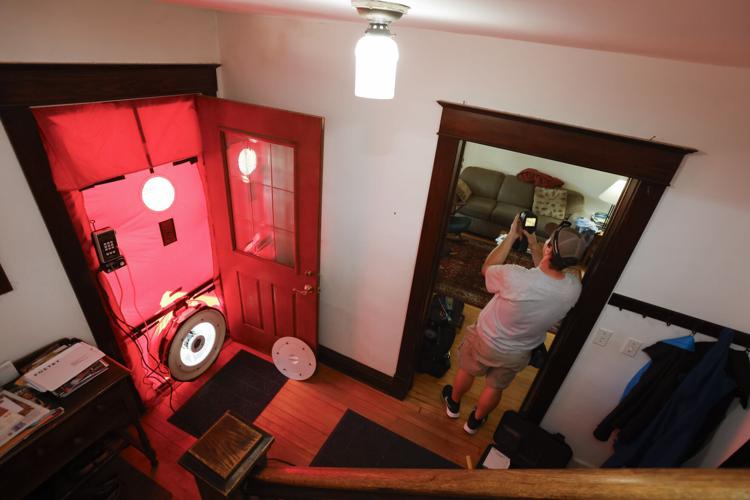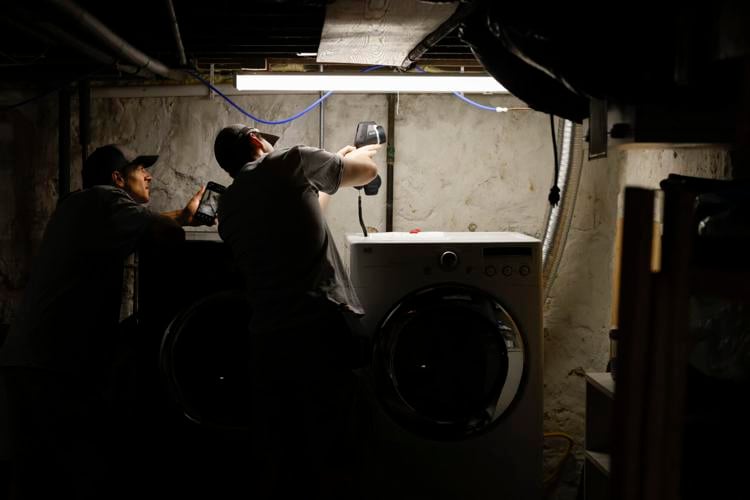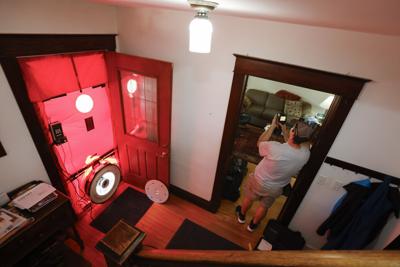Kevin Kane is staring down the barrel of a massive business opportunity — he just doesn’t know exactly when it might be coming.
The chief economist and co-founder of Green Homeowners United, a group that aims to make energy efficiency upgrades more accessible for homeowners, has been telling anyone who will listen about a slate of new programs, approved in the Inflation Reduction Act in 2022.
Those new initiatives will offer rebates to homeowners, particularly those who are less affluent, to make their home more energy efficient by installing a greener heat pump or making sure there is enough insulation to keep the heat in and the cold Wisconsin winter out.
But while clean energy groups, contractors and homeowners are excited by the possibilities of the programs, they remain months away from rolling out.
Key details also remain up in the air, subject to stakeholder input, that also could affect whether someone who pursues home upgrades now could be eligible for a rebate later.
For Kane, this means uncertainty about when to begin hiring more staff — a challenge in its own right — and ramping up to meet what is expected to be significant demand.
“Suddenly, if every building in this country is eligible for something, we're just not ready,” Kane said. “And we want to be. But most residential contractors cannot just hire a bunch of people and train them for nine months without giving them something specific to do.”
Wisconsin's energy efficiency program, Focus on Energy, has been tasked with setting up the rebates and marketing them to state residents. Staff at Focus on Energy are asking residents to give feedback over the next month, something required by the federal government.
From there, they will submit an application to the federal government, outlining the finer details of Wisconsin’s program, before the money is released. State officials say they are moving as fast as they can.
“I want these dollars out the door,” said Dylan Crye, residential portfolio manager for Focus on Energy and the point person for the rebate programs. “But we're not going to put out a program before we're confident that it's the right one. Sure, you know, I can put a cash hose out there, I can just spray dollars everywhere. But it doesn't mean that it's going into the right places and helping the right people in the way that they're meant to.”
But some believe the state needs to move more quickly to get the money out the door to help get the ball rolling so residents can save money on their utility bills and help address America's climate change problem.
“There needs to be, ultimately, some political will here to treat this like the urgent situation that it is, to act a lot more quickly,” said Robert Kraig, executive director of the consumer and policy advocacy group Citizens Action Wisconsin. “Not to just have normal governmental processes turn along.”
One rebate could be $14,000
The IRA and Bipartisan Infrastructure Law were chock full of programs designed to help local and state governments reduce carbon emissions, as well as tax credit programs to incentivize everyday people to embrace solar power and other technologies.
But rebate programs, which are already common in states like Wisconsin to help make energy efficient appliances and practices more cost-effective, work differently.
A tax credit reduces how much a person owes in taxes or increases their tax refund. But this can privilege more affluent homeowners, who have a larger tax liability and thus can more fully reap the benefits of a credit.
Rebates simply serve as cash back and the savings from the two IRA programs can be substantial.
One, called the Home Energy Performance-Based Whole-House Rebate, known as HOMES, provides rebates of up to $14,000 to cover everything from insulation that better retains heat to washers and dryers that use less power.
The rebates vary depending on a person’s income and how much energy they are projected to save, but a lower-income homeowner generally can expect a rebate of 50% or 80% of a project's cost.
A second program, the High-Efficiency Electric Home Rebate Act, known as HEEHRA, to purchase electrical appliances, such as HVAC systems and heat pumps. If a person makes less than 80% of the median income in a certain area, they can have 100% of their costs covered. Those who make slightly more can get a rebate for half of the costs.
Advocates argue these initiatives are a huge turning point, making products and renovations that are typically the domain of higher earners available to all, reducing energy use in the process.
“This is transformative work,” Kane said. “I mean, this is the biggest investment in addressing carbon emissions that this country has ever done.”
In an effort to determine what Wisconsin’s program will look like, Focus on Energy is hosting eight listening sessions, beginning on Tuesday in Green Bay, to gather feedback from residents, clean energy groups, contractors and others who are interested in shaping how the rebates are rolled out. An online survey is also available.
In some cases, Crye noted, the state has the flexibility to change rules or ask the federal government for more flexibility. That could include lifting a cap on the total costs that can be covered by a rebate for low-income homeowners.
But observers and contractors anxiously await the answer to other questions, including when the rebates will become available for customers. Currently, Focus on Energy is estimating that will happen in the fall.

Cory Witte and Hunter Prochaska, from Accurate-Airtight Exteriors, use an infrared camera to detect places where air is entering the home of C. R. Boardman during an energy audit at in Madison in August.
Advocates acknowledge the difficulty in quickly standing up a program that can include complicated rules and $146 million in federal funding.
It would be nice, however, if things were moving faster, said Jennifer Giegerich, government affairs director for Wisconsin Conservation Voters.
“We are behind in Wisconsin in getting this program rolled out at the state level,” she said.
Will energy savings be retroactive?
The question of how best to get the rebates out the door is facing nearly every state — except Florida, which is rejecting the funds entirely.
States have to apply to the federal government, outlining how their program will work and give the U.S. Department of Energy a chance to ensure that the framework fits in with the language of the IRA.
Four states — California, Hawaii, New Mexico and New York — submitted their plans to the federal government for the HOMES program this week. Wisconsin will do the same once the listening sessions are complete and the Public Service Commission approves the program rules.
But when looking at where other states sit in the process, Wisconsin doesn’t look too bad, said Robin Lisowski, managing director of policy for the anti-climate change nonprofit Slipstream.
Last week, Minnesota began soliciting contractors to help design the program and get it up and running. Wisconsin already made that decision, however, when officials chose to enlist Focus on Energy — something Lisowski said could ultimately help make things easier by relying on an existing institution with plenty of know-how on the subject.
Focus on Energy already administers energy efficiency rebates, some of which can be combined with the new federal programs to layer on the potential savings.
“Wisconsin is actually moving as fast if not a little bit faster than other Midwest states,” Lisowski said.
But a big question remains: Will the rebates be retroactive, meaning that a person who has work done this winter — possibly in response to the frigid temperatures blasting Wisconsin in recent weeks — will be eligible for money when the programs go live.
That will be hashed out, along with other questions about program design, in the listening sessions.
But some want clarity before now to allow contractors like Kane’s Green Homeowners United to begin preparing for what is to come and ensure that residents interested in making their homes more efficient don’t put off for the fall what could be done today.
“Green contractors are … put at a terrible disadvantage if they have to wait until the fall for any rebates to apply, because homeowners would be incentivized to do nothing all that time,” Kraig said.
Crye said that the program would ultimately be retroactive in some form but noted it is impossible for that to happen without the program rules in place. A more methodical approach would also limit the ability for scammers to pitch consumers on a bunch of home upgrades that ultimately might not be eligible for rebates.
“Honestly, that's my biggest concern, personally, that there's just people who ended up hurt because someone lied to them,” he said.
Not enough energy-efficiency pros
As the state government prepares to push out the unprecedented amount of federal rebates, others are also rushing to get ready.
Green Homeowners United could end up tripling its 10-person crew — but finding enough qualified personnel could be a challenge.
There are not enough people trained to conduct home assessments, outlining where a homeowner might make energy efficiency improvements.
In order to qualify for the HOMES program, a person must first undertake one of those assessments, meaning demand will be sky high.
In other cases, training to install heat pumps and other appliances can take years. And Wisconsin has no apprenticeship program targeting workers seeking to tackle energy efficiency projects for residential homeowners.
That might change in the future but, for now, it gives a brief window of time to begin to grow the workforce, Kane said.
“That’s a good problem to have,” he said. “But we need to figure out how to build in the time to onboard (workers), train them, correct their errors, get them classroom teaching, on-the-job teaching, apprenticeship, hands-on work. That’s something that we plan on doing, I just don’t know when to start it.”
Crye noted that Focus on Energy had been presenting to contractors on the rebates at an annual breakfast meeting between the two groups. A separate pot of federal money to train contractors will also be available.
And then there is the matter of getting the word out to everyone else.
More people than ever are set to be eligible for a rebate, even those who traditionally haven’t participated in one of Focus on Energy’s programs.
Local governments and community groups who know how best to reach people who are eligible would be crucial, Crye said.
“We've got to go where they're at, right?” he said. “Like, we can't expect that they're gonna find us.”
Wisconsin Conservation Voters went door-to-door in the fall to inform residents about all of the IRA programs, including the tax credit and rebate offerings.
Roughly one-third of those reached had not heard of the federal law and another third had only a passing familiarity with its provisions, said Seth Hoffmeister, the group’s deputy director.
While residents were most excited about other initiatives, he said the group was hoping to continue reaching people in the spring and talking about the rebates more. Eventually, the goal is for the programs to sell themselves via word of mouth.
“I think that there's really going to be a snowballing effect,” Hoffmeister said.
Giegerich, also of Wisconsin Conservation Voters, said there would be a real need to create materials, such as an easy-to-use website, that clearly break down how the programs work and how much money a person could save, depending on their project and income.
“If we are able to make these programs user-friendly, people will absolutely take advantage of that,” she said. “I mean, what could be better than saving money and saving the planet at the same time?"








